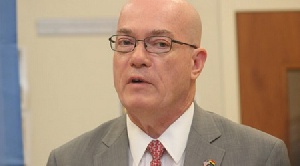 Mr Robert Porter Jackson, United States
Mr Robert Porter Jackson, United States
Mr Robert Porter Jackson, United States’ Ambassador to Ghana, says corruption will remain a challenge to Ghana’s development if the creation of the Special Prosecutor’s Office does not lead to prosecutions and convictions.
He noted that while Ghana was currently not the most corrupt nation, it was also not the least corrupt country, with corruption perceptions getting worse.
He said there was the need for serious accountability in order to have transparency, and lauded the creation of the Special Prosecutor’s Office. He, however, maintained that “until there are actual prosecutions and convictions, this will remain a key issue facing Ghana and retarding its development”.
He made the statement during a panel discussion at the launch of the National Anti-Corruption and Transparency Week in Accra yesterday.
He noted that Ghana was a wealthy country and would be able to continue its development in the absence of aid if it put in place the right measures.
“…If you do open public procurement, if you allow people to compete, if you have a right to information bill so that people can acquire information, if you prosecute people and hold them accountable, Ghana’s revenue will be substantially higher, so there will be much less need for foreign assistance,” he stated.
He added that Ghana’s wealth should be channelled into schools, hospitals and other social services, instead of into someone’s car or home.
Mr Yaw Osafo-Maafo, Senior Minister, who participated in the panel discussion and also launched the week, said President Akufo-Addo’s government was committed to ensuring that people who had wronged the state through corruption were punished for their wrongs.
He said though Ghanaians were getting disappointed and impatient with the delay or lack of prosecution of perpetrators of corruption, the government was keen on ensuring that thorough investigations were carried before any action was taken on them.
“We are certainly going to make people who have wronged this country in corruption suffer for their deeds, but we don’t want to do this in a hurry because we must do the thorough investigation. We must not do things in such a way that it’s like we’re after our political opponents; far from it. We must do it in such a way that people who have wronged the system are identified through thorough investigation and made to answer for their crimes, according to the laws of the land,” he said.
Other panellists, including Nana Osei Bonsu of the Private Enterprise Federation, and Professor John Asafo Adjei, a senior fellow of the Institute of Economic Affairs, maintained that the perceptions of corruption were on the rise, even though it did not necessarily imply a rise in actual corruption.
They stressed the need to stem the ‘bleeding’ and empower the private sector to resist corruption in order to ensure that Ghana survived beyond aid. Mr Joseph Whittal, Commissioner of the Commission on Human Rights and Administrative Justice (CHRAJ), highlighted the need for collaboration among various stakeholders to address the problem of corruption, which, he noted, posed a great challenge to the development of the country.
“No one person, institution, or sector can fight it alone; neither public education nor law enforcement nor prevention, standing alone, can effectively combat corruption,” he said, adding that corruption must be addressed as a collective responsibility by all sectors of society.
Mr Zoltan Agai, head of the European Union Commission in Ghana, said corruption was at the heart of many of the world’s problems and tackling it was vital for sustainable economic growth.
He said the impunity achieved by perpetrators of corruption was a major contributor to poverty, thus the commitment of development partners like the EU to the fight against corruption.
He also commended the passing of the Special Prosecutor’s Office Bill and appealed to the government to provide the needed resources to frontline anti-corruption institutions to help them deliver on their mandate.
The week will include a two-day anti-corruption conference with the Inter Anti-Corruption Day celebration of December 9, regional dialogues on corruption, debates at some tertiary institutions, as well as a public sector leadership awards.
Information about the week will be available on social media with the hashtag #GhanaSaysNo.